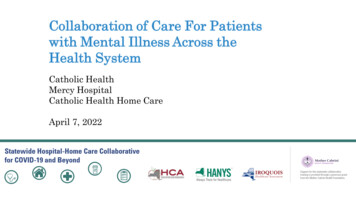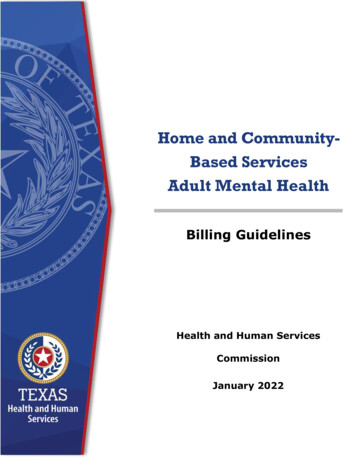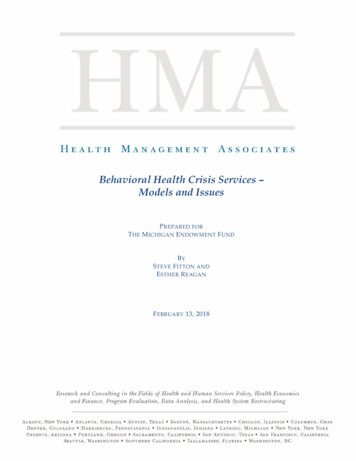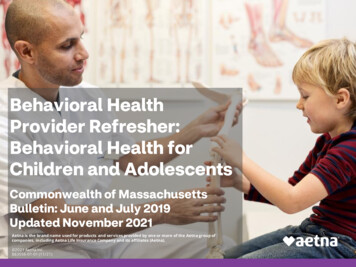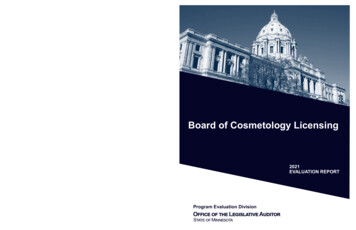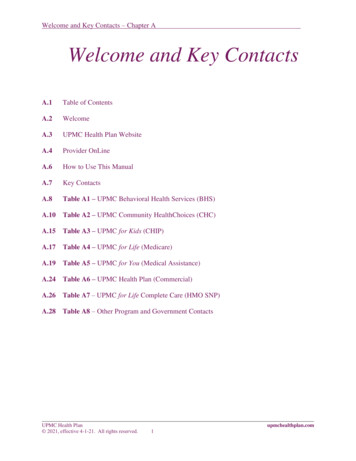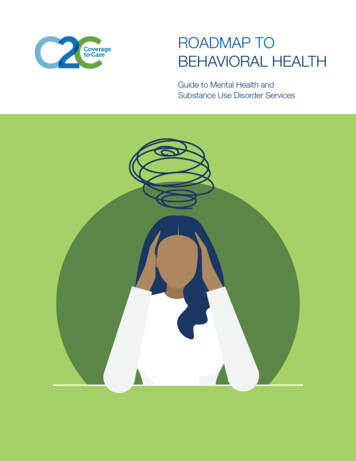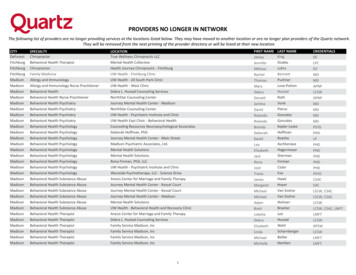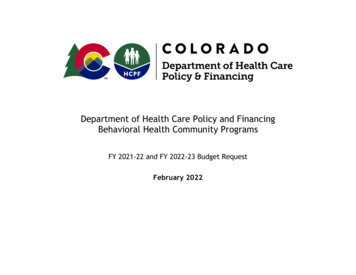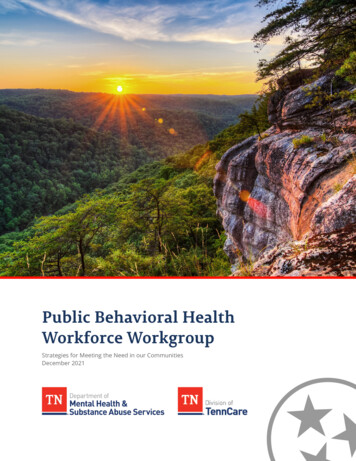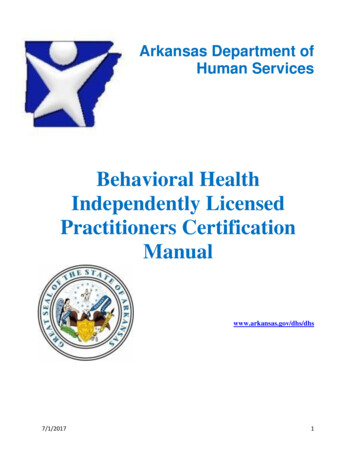
Transcription
Arkansas Department ofHuman ServicesBehavioral HealthIndependently LicensedPractitioners 71
ARKANSAS DEPARTMENT OFHUMAN SERVICESIndependently Licensed PractitionerProvider Certification Rules7/1/20172
I.PURPOSE:A. To assure that Outpatient Behavioral Health Services (“OBHS”) care and servicesprovided by certified Independently Licensed Practitioners comply with applicable laws,which require, among other things, that all care reimbursed by the Arkansas MedicalAssistance Program (“Medicaid”) must be provided efficiently, economically, only whenmedically necessary, and is of a quality that meets professionally recognized standardsof health care.B. The requirements and obligations imposed by §§ I-XIII of this rule are substantive, notprocedural.II.SCOPE:A. Current Independently Licensed Practitioner certification under this policy is a conditionof Medicaid provider enrollment.B. Division of Behavioral Health Services (“DHS”) Independently Licensed Practitionercertification must be obtained for each site before application for Medicaid providerenrollment. An applicant may submit one application for multiple sites, but DHS willreview each site separately and take separate certification action for each site.III.DEFINITIONS:A. “Adverse license action” means any action by a licensing authority that is related to clientcare, any act or omission warranting exclusion under DHS Policy 1088, or that imposesany restriction on the licensee’s practice privileges. The action is deemed to exist whenthe licensing entity imposes the adverse action except as provided in Ark. Code Ann. §25-15-211 (c).B. “Applicant” means an Independently Licensed Practitioner that is seeking DHScertification as an Independently Licensed Practitioner.C. “Certification” means a written designation, issued by DHS, declaring that the providerhas demonstrated compliance as declared within and defined by this rule.D. “Client” means any person for whom an Independently Licensed Practitioner furnishes, orhas agreed or undertaken to furnish, Counseling Level Outpatient Behavioral Healthservices.E. “Client Information System” means a comprehensive, integrated system of clinical,administrative, and financial records that provides information necessary and useful todeliver client services. Information may be maintained electronically, in hard copy, orboth.F. “Compliance” means conformance with:1. Applicable state and federal laws, rules, and regulations including, without limitation:7/1/20173
a. Titles XIX and XXI of the Social Security Act and implementing regulations;b. Other federal laws and regulations governing the delivery of health care fundedin whole or in part by federal funds, for example, 42 U.S.C. § 1320c-5;c. All state laws and rules applicable to Medicaid generally and to an IndependentlyLicensed Practitioner services specifically;d. Title VI of the Civil Rights Act of 1964 as amended, and implementingregulations;e. The Americans With Disabilities Act, as amended, and implementing regulations;f.The Health Insurance Portability and Accountability Act (“HIPAA”), as amendedand implementing regulations.G. “Contemporaneous” means by the end of the performing provider’s first work periodfollowing the provision of care of services to be documented, or as provided in theOutpatient Behavioral Health Services manual, whichever is longer.H. “Coordinated Management Plan” means a plan that the provider develops and carriesout to assure compliance and quality improvement.I. “Corrective Action Plan” (CAP) means a document that describes both short- termremedial steps to achieve compliance and permanent practices and procedures tosustain compliance.J. “Cultural Competency” means the ability to communicate and interact effectively withpeople of different cultures, including people with disabilities and atypical lifestyles.K. “DHS” means the Arkansas Department of Human Services Division of Behavioral HealthServices.L. “Deficiency” means an item or area of noncompliance.M. “DHS” means the Arkansas Department of Human Services.N. “Emergency an Independently Licensed Practitioner services” means nonscheduled anIndependently Licensed Practitioner services delivered under circumstances where aprudent layperson with an average knowledge of behavioral health care wouldreasonably believe that an Independently Licensed Practitioner services are immediatelynecessary to prevent death or serious impairment of health.O. “Independently Licensed Practitioner” is an individual that is licensed to engage inprivate/independent practice by the appropriate State Board. The following licensurecan qualify as Independently Licensed Practitioners:1. Licensed Certified Social Worker (LCSW)2. Licensed Marital and Family Therapist (LMFT)7/1/20174
3. Licensed Psychologist (LP)4. Licensed Psychological Examiner – Independent (LPEI)5. Licensed Professional Counselor (LPC)P. “Mobile care” means a face-to-face intervention with the client at a place other than acertified site operated by the provider. Mobile care must be:1. Either clinically indicated in an emergent situation or necessary for the client to haveaccess to care in accordance with the care plan;2. Delivered in a clinically appropriate setting; and3. Delivered where Medicaid billing is permitted if delivered to a Medicaid eligible client.Q. “NPDB” means the United States Department of Health and Human Services, HealthResources and Services Administration National Provider Data Bank.R. “Performing provider” means an Independently Licensed Practitioner who personallydelivers a care or service directly to a client.S. “Professionally recognized standard of care” means that degree of skill and learningcommonly applied under all the circumstances in the community by the average prudentreputable member of the profession. Conformity with Substance Abuse and MentalHealth Services Administration (SAMHSA) evidence-based practice models is evidenceof compliance with professionally recognized standards of care.T. “Provider” means an Independently Licensed Practitioner that is certified by DHS andenrolled by DMS to provide Outpatient Behavioral Health Services.U. “Reviewer” means a person employed or engaged by:1. DHS or a division or office thereof;2. An entity that contracts with DHS or a division or office thereof.V. “Site” means a distinct place of business dedicated to the delivery of OutpatientBehavioral Health Services. Each site where an Independently Licensed Practitionerperforms services at must be certified by the Division of Behavioral Health Services.Colocation within an office or clinic of a physician or psychologist is allowed for anIndependently Licensed Practitioner. However, an Independently Licensed Practitionersite cannot be an adjunct to a school, a day care facility, or a long-term care facility.Each site shall be a bona fide an Independently Licensed Practitioner site.W. “Site relocation” means closing an existing site and opening a new site.X. “Site transfer” means moving existing staff, program, and clients from one physical7/1/20175
location to a second location.Y. “Supervise” as used in this rule means to direct, inspect, observe, and evaluateperformance.Z. “Supervision documentation” means written records of the time, date, subject(s), andduration of supervisory contact maintained in the provider’s official records.IV.COMPLIANCE TIMELINE:A. All Independently Licensed Practitioner sites must receive an on-site inspection in orderto obtain DHS certification as an Independently Licensed Practitioner site.B. DHS may authorize temporary compliance exceptions for Independently LicensedPractitioners, if deemed necessary by DHS.V.APPLICATION FOR DHS INDEPENDENTLY LICENSED PRACTITIONERCERTIFICATION:A. Applicants must complete form DMS-633, which can be found at the following ments/LMHP%20Form%20633.pdfB. Applicants must submit the completed application forms and all required attachments foreach proposed site to:Department of Human ServicesDivision of Provider Services and Quality AssuranceATTN: Licensure and CertificationP.O. Box 1437 S-530Little Rock, AR 72203C. Each applicant must be an Independently Licensed Practitioner:1. Whose primary purpose is the delivery of a continuum of outpatient behavioral healthservices in a free standing independent clinic;2. That is independent of any DHS certified Behavioral Health Agency.D. Independently Licensed Practitioner certification is not transferable or assignable.E. The privileges of an Independently Licensed Practitioners certification are limited to thecertified site.F. Providers may file Medicaid claims only for Outpatient Behavioral Health Servicesdelivered by an Independently Licensed Practitioner.G. Applications must be made in the name used to identify the business entity to theSecretary of State and for tax purposes.7/1/20176
H. The applicant must attach the Independently Licensed Practitioner family involvementpolicy to each application.VI.APPLICATION REVIEW PROCESS:A. Timeline:1. DHS will review Independently Licensed Practitioner application forms and materialswithin ninety (90) calendar days after DHS receives a complete application package.(DHS will return incomplete applications to senders without review.)2. For approved applications, a site survey will be scheduled within forty-five (45)calendar days of the approval date.3. DHS will mail a survey report to the applicant within twenty-five (25) calendar days ofthe site visit. Providers having deficiencies on survey reports must submit anapprovable corrective action plan to DHS within thirty-five (35) calendar days afterthe date of a survey report.4. DHS will accept or reject each corrective action plan in writing within twenty (20)calendar days after receipt.5. Within thirty (30) calendar days after DHS approves a corrective action plan, theapplicant must document implementation of the plan and correction of thedeficiencies listed in the survey report. Applicants who are unable, despite theexercise of reasonable diligence, to correct deficiencies within the time permittedmay obtain up to ten (10) additional days based on a showing of good cause.6. DHS will furnish site-specific certificates via postal or electronic mail within ten (10)calendar days of issuing a site certification.B. Survey Components: Each site survey will ensure that the site is in compliance withfacility environment requirements, location in Section 000.000 of this certificationmanual. The site survey will also ensure that the Independently Licensed Practitionercomplies with policy requirements and record keeping requirements.C. Determinations:1. Application approved.2. Application returned for additional information.3. Application denied. DHS will state the reasons for denial in a written response to theapplicant.VII.DHS Access to Applicants/Providers:A. DHS may contact applicants and providers at any time;B. DHS may make unannounced visits to applicants/providers.7/1/20177
C. Applicants/providers shall provide DHS prompt direct access to applicant/providerdocuments and to applicant/provider staff and contractors.D. DHS reserves the right to ask any questions or request any additional informationrelated to certification.VIII.ADDITIONAL CERTIFICATION REQUIREMENTS:A. Care and Services must:1. Comply with all state and federal laws, rules, and regulations applicable to thefurnishing of health care funded in whole or in part by federal funds; to all state lawsand policies applicable to Arkansas Medicaid generally, and to Outpatient BehavioralHealth Services specifically, and to all applicable Department of Human Services(“DHS”) policies including, without limitation, DHS Participant Exclusion Policy §1088.0.0. The Participant Exclusion Policy is available online ms/By%20Policy.aspx2. Conform to professionally recognized behavioral health rehabilitative treatmentmodels.3. Be established by contemporaneous documentation that is accurate anddemonstrates compliance. Documentation will be deemed to be contemporaneous ifrecorded by the end of the performing provider’s first work period following theprovision of the care or services to be documented, or as provided in the OutpatientBehavioral Health Services manual, whichever is longer.B. Applicants and Independently Licensed Practitioners must:1. Be a legal entity in good standing;2. Maintain all required business licenses;3. Adopt a mission statement to establish goals and guide activities;4. Maintain a current organizational chart that identifies administrative and clinicalchains of command.C. Applicants/providers must establish and comply with operating policy that at a minimumimplements credible practices and standards for:1. Compliance;2. Cultural competence;3. Provision of services, including referral services, for clients that are indigent, have nosource of third party payment, or both, including:a. Procedures to follow when a client is rejected for lack of a third-party paymentsource or when a client is discharged for nonpayment of care.7/1/20178
b. Coordinated referral plans for clients that the provider lacks the capacity toprovide medically necessary Outpatient Behavioral Health Services. Coordinatedreferral plans must:IX.i.Identify in the client record the medically necessary Outpatient BehavioralHealth Services that the provider cannot or will not furnish;ii.State the reason(s) in the client record that the provider cannot or will notfurnish the care;iii.Provide quality-control processes that assure compliance with care,discharge, and transition plans.REQUIREMENTS FOR CERTIFICATIONA. Independently Licensed Practitioner may not furnish Outpatient Behavioral HealthServices during any time the professional’s license is subject to adverse license action.B. Applicants/providers may not employ/engage a covered health care practitioner afterlearning that the practitioner:1. Is excluded from Medicare, Medicaid, or both;2. Is debarred under Ark. Code Ann. § 19-11-245;3. Is excluded under DHS Policy 1088; or4. Was subject to a final determination that the provider failed to comply withprofessionally recognized standards of care, conduct, or both. For purposes ofthis subsection, “final determination” means a final court or administrativeadjudication, or the result of an alternative dispute resolution process such asarbitration or mediation.C. Independently Licensed Practitioner must maintain copies of disclosure forms signed bythe client, or by the client’s parent or guardian before Outpatient Behavioral HealthServices are delivered except in emergencies. Such forms must at a minimum:1. Disclose that the services to be provided are Outpatient Behavioral Health Services;2. Explain Outpatient Behavioral Health Services eligibility, SED and SMI criteria;3. Contain a brief description of the Independently Licensed Practitioner services;4. Explain that all Outpatient Behavioral Health Services care must be medicallynecessary;5. Disclose that third party (e.g., Medicaid or insurance) Outpatient Behavioral HealthService payments may be denied based on the third party payer’s policies or rules;7/1/20179
6. Identify and define any services to be offered or provided in addition to those offeredby the Independently Licensed Practitioner, state whether there will be a charge forsuch services, and if so, document payment arrangements;7. Notify that services may be discontinued by the client at any time;8. Offer to provide copies of Independently Licensed Practitioner and OutpatientBehavioral Health Services rules;9. Provide and explain contact information for making complaints to the providerregarding care delivery, discrimination, or any other dissatisfaction with careprovided by the Independently Licensed Practitioner;10. Provide and explain contact information for making complaints to state and federalagencies that enforce compliance under § III(G)(1).D. Outpatient Behavioral Health Services maintained by the Independently LicensedPractitioner must include:1. Outpatient Services, including individual and family therapy at a minimum.2. Ability to provide Pharmacologic Management at the certified site or the agreementof collaboration with a physician to provide Pharmacologic Management for clients ofthe Independently Licensed Practitioner.3. Ability to refer clients to other practitioners or agencies for Outpatient BehavioralHealth Services.E. Providers must tailor all Outpatient Behavioral Health Services care to individual clientneed. If client records contain entries that are materially identical, DHS and the Divisionof Medical Services will, by rebuttable presumption, that this requirement is not met.F. Outpatient Behavioral Health Services for individuals under age eighteen (18): Providersmust establish and implement policies for family identification and engagement intreatment for persons under age eighteen (18), including strategies for identifying andovercoming barriers to family involvement.G. Emergency Response Services: Applicants/providers must establish, implement, andmaintain a site-specific emergency response plan, which must include:1. A 24-hour emergency telephone number;2. The applicant/provider must:a. Provide the 24-hour emergency telephone number to all clients;b. Post the 24-hour emergency number on all public entries to each site;c. Include the 24-hour emergency phone number on answering machine greetings;7/1/201710
d. Identify local law enforcement and medical facilities within a 50-mile radius thatmay be emergency responders to client emergencies.3. Direct access to a mental health professional within fifteen (15) minutes of anemergency/crisis call and face-to-face crisis assessment within two (2) hours;4. Response strategies based upon:a. Time and place of occurrence;b. Individual’s status (client/non-client);c. Contact source (family, law enforcement, health care provider, etc.).5. Requirements for a face-to-face response to requests for emergency interventionreceived from a hospital or law enforcement agency regarding a current client.6. All face-to-face emergency responses shall be:a. Available 24 hours a day, 7 days a week;b. Made by a mental health professional within two (2) hours of request (unless adifferent time frame is within clinical standards guidelines and mutually agreedupon by the requesting party and the MHP responding to the call).7. Emergency services training requirements to ensure that emergency service areage-appropriate and comply with accreditation requirements. Providers shallmaintain documentation of all emergency service training in each trainee’s personnelfile.8. Requirements for clinical review by the clinical supervisor or emergency servicesdirector within 24 hours of each after-hours emergency intervention with suchadditional reporting as may be required by the provider’s policy.9. Requirements for documentation of all crisis calls, responses, collaborations, andoutcomes;10. Requirements that emergency responses not vary based on the client’s fundingsource. If a client is eligible for inpatient behavioral health care funded through thecommunity mental health centers and the provider is not a community mental healthcenter with access to these funds, the provider must:a. Determine whether the safest, least restrictive alternative is psychiatrichospitalization; andb. Contact the appropriate community mental health center (CMHC) for consult andto request the CMHC to access local acute care funds for those over 21.11. The above crisis response requirements can be addressed through an agreementwith another provider (i.e., Behavioral Health Agency, Independently Licensed7/1/201711
Practitioner). Crisis response plans must be discussed with clients and must beavailable for review.O. Each applicant/provider must establish and maintain procedures, competence, andcapacity:1. For assessment and individualized care planning and delivery;2. For discharge planning integral to treatment;3. For mobile care;4. To assure that each mental health professional makes timely clinical dispositiondecisions;5. To make timely referrals to other services;6. To refer for inpatient services or less restrictive alternative;P. Each applicant/provider must establish, maintain, and document a quality improvementprogram, to include:1. Evidence based practices;2. Requirements for informing all clients and clients’ responsible parties of the client’srights while accessing services.3. Regular (at least quarterly) quality assurance meetings that include:X.SITE REQUIREMENTS:A. All Independently Licensed Practitioner sites must be located inside the State ofArkansas;B. The Independently Licensed Practitioner site shall obtain an annual fire and safetyinspection from the State Fire Marshall or local authorities which documentsapproval for continued occupancy.C. All Independently Licensed Practitioner site staff shall know the exact location,contents, and use of first aid supply kits and fire fighting equipment and fire detectionsystems. All fire fighting equipment shall be annually maintained in appropriatelydesignated areas within the facility.D. The Independently Licensed Practitioner site shall post written plans and diagramsnoting emergency evacuation routes in case of fire, and shelter locations in case ofsevere weather. All exits must be clearly marked.E. The Independently Licensed Practitioner site shall be maintained in a manner, whichprovides a safe environment for clients, personnel, and visitors.7/1/201712
F. The Independently Licensed Practitioner site telephone number(s) and actual hoursof operation shall be posted at all public entrances.G. The Independently Licensed Practitioner site shall establish policies for maintainingclient records, including policies designating where the original records are stored.H. Each Independently Licensed Practitioner site shall maintain an organized medicalrecord keeping system to collect and document information appropriate to thetreatment processes. This system shall be organized; easily retrievable, usablemedical records stored under confidential conditions and with planned retention anddisposition.XI.SITE RELOCATION, OPENING, AND CLOSING (Note: temporary service disruptionscaused by inclement weather or power outages are not “closings.”)A. Planned Closings:1. Upon deciding to close a site either temporarily or permanently, the IndependentlyLicensed Practitioner immediately must provide written notice to clients and to theDepartment of Human Services, Division of Behavioral Health Services.2. Notice of site closure must state the site closure date;3. If site closure is permanent, the site certification expires at 12:00 a.m. the dayfollowing the closure date stated in the notice;4. If site closing is temporary, and is for reasons unrelated to adverse governmentalaction, DHS may suspend the site certification for up to one (1) year if theIndependently Licensed Practitioner maintains possession and control of the site.If the site is not operating and in compliance within the time specified in the sitecertification suspension, the site certification expires at 12:00 a.m. the day after thesite certification suspension ends.B. Unplanned Closings:1. If an Independently Licensed Practitioner must involuntarily close a site due to, forexample, fire, natural disaster, or adverse governmental action, the provider mustimmediately notify clients and families, DHS, the Division of Medical Services, theMedicaid fiscal agent, and the accrediting organization of the closure and thereason(s) for the closure.2. Site certification expires in accordance with any pending regulatory action, or, if noregulatory action is pending, at 12:00 a.m. the day following permanent closure.C. All Closings:1. Independently Licensed Practitioner must assure and document continuity of care7/1/201713
for all clients who receive Outpatient Behavioral Health Services at the site;2. Notice of Closure and Continuing Care Options:a. Independently Licensed Practitioner must assure and document that clients andfamilies receive actual notice of the closure, the closure date, and anyinformation and instructions necessary for the client to obtain transition services;b. After documenting that actual notice to a specific client was impossible despitethe exercise of due diligence, Independently Licensed Practitioners may satisfythe client notice requirement by mailing a notice containing the informationdescribed in subsection (a), above, to the last known address provided by theclient; andc. Before closing, Independently Licensed Practitioner must post a public notice atthe site entry.3. An acceptable transition plan is described below:Transition Plan:1. Provide clients/families with the referral information and have them sign a transfer ofrecords form/release of information to enable records to be transferred to the provider oftheir choice.2. Transfer records to the designated provider.Designate a records retrieval process as specified in Section I of the Arkansas MedicaidOutpatient Behavioral Health Services Provider Policy Manual § 142.300.Submit a reporting of transfer to DHS (Attn: Policy & Certification Office) including alist of client names and the disposition of each referral. See example below:NameReferred to:Records Transfer Status:RX Needs Met By:JohnnyOP Provider Nameto be delivered 4/30/20XXProvided 1 month RXMaryPrivate Provider NameDelivered 4/28/20XXNo MedsJudyDeclined ReferralXX6. DHS may require additional information regarding documentation of client transfers toensure that client needs are addressed and met.A site closing Form is available at: www.arkansas.gov/dhs/dhs See appendix#97/1/201714
D. New Sites: Providers may apply for a new site by completing the new site Formavailable at www.arkansas.gov/dhs/dhsSee appendix # 10 DHS Form # 5 – (Adding Site)E. Site Transfer:1. At least forty-five (45) calendar days before a proposed transfer of a certified site, theprovider must apply to DHS to transfer site certification.2. The provider must notify clients and families at least thirty (30) calendar days beforethe transfer;3. DHS requires an on-site survey prior to allowance of service at the new site. TheDivision of Medical Services does not require a new Medicaid provider number. Themoving or transferring site form is available at: www.arkansas.gov/dhs/dhsSee appendix # 9 – DHS Form # 4 (Closing and Moving Sites)F. Site Relocation: The provider must follow the rules for closing the original site, and therules for opening a new site.XII.PROVIDER RE-CERTIFICATION:A. The term of DHS site certification is continuous for 3 years from the date of Certificationas long as the site is not transferred and the Independently Licensed Practitionermaintains appropriate Licensure. If an Independently Licensed Practitioner losesappropriate licensure, the site that they operate in will lose certification.B. Providers must furnish DHS a copy of:1. An application for provider and site recertification:a. DHS must receive provider and site recertification applications at least fifteen(15) business days before the DHS Independently Licensed Practitionercertification expiration date;b. The Re-Certification form with required documentation is available atwww.arkansas.gov/dhs/dhsSee Appendix # 11 DHS Form 3 (Re-certification)C. If DHS has not recertified the provider and site(s) before the certification expiration date,certification is void beginning 12:00 a.m. the next day.XIII.MAINTAINING DHS INDEPENDENTLY LICNESED PRACTITIONER CERTIFICATION:A. Providers must:1. Maintain compliance;7/1/201715
2. Assure that DHS certification information is current, and to that end must notify DHSwithin thirty (30) calendar days of any change affecting the accuracy of the provider’scertification records;3. Display the Independently Licensed Practitioner certificate for each site at aprominent public location within the siteB. Annual Reports:1. Providers must furnish annual reports to DHS before July 1 of each year that theprovider has been in operation for the preceding twelve (12) months.1. Annual report shall be prepared by completing forms provided by DHS. The annualreport form is available at www.arkansas.gov/dhs/dhs and at Appendix # 12 DHSForm # 6XIV.NONCOMPLIANCEA. Failure to comply with this rule may result in one or more of the following:1. Submission and implementation of an acceptable corrective action plan as acondition of retaining Independently Licensed Practitioner certification;2. Suspension of Independently Licensed Practitioner certification for either a fixedperiod or until the provider meets all conditions specified in the suspension notice;3. Termination of Independently Licensed Practitioner certification.XV.APPEAL PROCESSA. If DHS denies, suspends, or revokes any Independently Licensed Practitionercertification (takes adverse action), the affected proposed provider or provider mayappeal the DHS adverse action. Notice of adverse action shall comply with Ark. CodeAnn. §§ 20-77-1701-1705, and §§1708-1713. Appeals must be submitted in writing tothe DHS Director. The provider has thirty (30) calendar days from the date of the noticeof adverse action to appeal. An appeal request received within thirty-five (35) calendardays of the date of the notice will be deemed timely. The appeal must state withparticularity the error or errors asserted to have been made by DHS in denyingcertification, and cite the legal authority for each assertion of error. The provider mayelect to continue Medicaid billing under the Outpatient Behavioral Health Servicesprogram during the appeals process. If the appeal is denied, the provider must return allmonies received for Independently Licensed Practitioner services provided during theappeals process.B. Within thirty (30) calendar days after receiving an appeal the DHS D
1. Application approved. 2. Application returned for additional information. 3. Application denied. DHS will state the reasons for denial in a written response to the applicant. VII. DHS Access to Applicants/Providers: A. DHS may contact applicants and providers at any time; B. DHS may make unannounced visits to applicants/providers.
